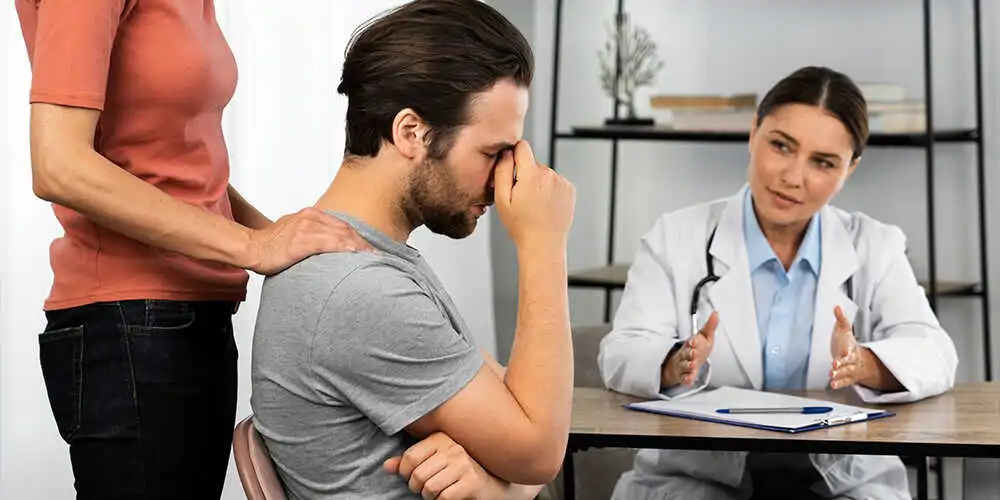Addiction is a complex and challenging condition that affects millions of lives globally. Recognizing the need for professional help, many individuals seek rehabilitation to overcome substance abuse and achieve long-term recovery. The journey to recovery involves multiple stages, including detoxification, therapy, and mental health rehabilitation. The duration of Addiction Treatment and Rehabilitation plays a crucial role in ensuring a successful and lasting recovery.
The Detoxification Phase
Detoxification, commonly known as detox, is the first step in addiction treatment. It involves the process of eliminating toxins from the body that have accumulated due to substance abuse. Detox is crucial as it helps manage withdrawal symptoms that can be both physically and psychologically distressing.
The duration of detox treatment can vary significantly based on several factors, including the substance of abuse, the severity of the addiction, the individual’s overall health, and the detox protocols of the chosen facility. Detox can last anywhere from a few days to a couple of weeks. Medical supervision is crucial during this phase to ensure the individual’s safety and comfort.
Detox Treatment in Gurgaon
For individuals seeking detox treatment in Gurgaon, there are various reputable facilities that offer specialized care. These facilities provide medical supervision and personalized treatment plans tailored to the individual’s needs. Detox treatment centers in Gurgaon offer a supportive environment where medical professionals monitor the withdrawal process and provide necessary interventions to manage symptoms.
Cocaine Addiction Treatment Center in Gurgaon
Cocaine addiction is a particularly challenging condition to overcome due to its powerful effects on the brain’s reward system. Many individuals struggling with cocaine addiction require intensive treatment to address both the physical and psychological aspects of their addiction.
Gurgaon boasts a cocaine addiction treatment center that focuses on comprehensive care for individuals grappling with this specific addiction. The center employs evidence-based therapies and experienced medical staff to guide patients through their recovery journey. The duration of treatment at the cocaine addiction treatment center in Gurgaon can vary depending on the individual’s progress, but it often involves an extended commitment to ensure lasting recovery.
The Role of Therapy in Addiction Treatment
Addiction is not solely about the consumption of substances; it is also about the underlying factors that drive individuals to seek solace, escape, or pleasure from these substances. Psychological triggers, unresolved trauma, mental health disorders, and emotional struggles can contribute to the development and perpetuation of addiction. Therefore, a comprehensive approach to addiction treatment must encompass therapies that delve into these psychological factors.
Some of the common types of therapies used in addiction treatment are:
-
Individual Therapy:
Individual therapy, often referred to as psychotherapy or talk therapy, involves one-on-one sessions between the individual and a trained therapist. This type of therapy provides a safe space for individuals to explore their thoughts, emotions, behaviors, and underlying issues that contribute to their addiction. Through guided discussions, individuals gain insights into their triggers, coping mechanisms, and patterns of behavior. Cognitive-behavioral therapy (CBT), dialectical behavior therapy (DBT), and psychodynamic therapy are commonly used approaches in individual therapy for addiction.
-
Group Therapy:
Group therapy involves sessions led by a therapist and attended by a small group of individuals facing similar challenges. This format encourages participants to share their experiences, provide support to one another, and learn from different perspectives. Group therapy fosters a sense of belonging, reduces feelings of isolation, and provides opportunities for individuals to practice interpersonal skills and receive feedback in a controlled environment.
-
Family Therapy:
Addiction doesn’t just affect the individual; it also impacts their loved ones. Family therapy involves sessions where family members and the individual in treatment come together to address family dynamics, communication issues, and shared experiences. This type of therapy can help heal strained relationships, enhance understanding, and create a supportive environment for the individual’s recovery journey.
-
Behavioral Therapies:
Behavioral therapies focus on identifying and modifying unhealthy patterns of behavior that contribute to addiction. These therapies aim to reinforce positive behaviors and extinguish negative ones. Techniques such as contingency management, where individuals receive rewards for staying sober, and aversion therapy, where negative associations are created with substances, are used to encourage lasting behavioral change.
-
Holistic Therapies:
Holistic therapies take a more holistic approach to addiction treatment, addressing the individual’s physical, emotional, and spiritual well-being. Therapies such as art therapy, music therapy, mindfulness meditation, and yoga can help individuals reconnect with themselves, manage stress, and find healthy outlets for their emotions.
Benefits of Therapy in Addiction Treatment
Mentioned below are some of the common benefits of addiction treatment using therapies:
-
Addressing Underlying Causes:
Therapy helps individuals uncover the root causes of their addiction, whether they stem from past trauma, mental health issues, or challenging life circumstances. By addressing these underlying causes, individuals can work towards healing and lasting recovery.
-
Learning Coping Strategies:
Addiction often serves as a coping mechanism for dealing with stress, pain, and emotions. Through therapy, individuals learn healthier coping strategies and develop the skills to manage triggers and cravings without resorting to substances.
-
Relapse Prevention:
Therapy equips individuals with the tools they need to prevent relapse. By recognizing high-risk situations and developing strategies to navigate them, individuals can maintain their sobriety even after completing formal treatment.
-
Rebuilding Relationships:
Family and group therapy help repair and strengthen relationships that may have been strained due to addiction. This support system plays a crucial role in an individual’s ongoing recovery.
-
Empowerment:
Therapy empowers individuals to take control of their lives and make positive choices. It fosters a sense of agency, self-awareness, and self-esteem, which are essential for long-term recovery.
Striving for the Best Mental Health Rehabilitation
Recovery from addiction is not a one-size-fits-all journey. Some individuals may require extended periods of treatment and support to achieve their goals. The concept of the best mental health rehabilitation encompasses a comprehensive and holistic approach to supporting individuals on their journey toward mental well-being and overall recovery. It goes beyond traditional treatment modalities by addressing various aspects of an individual’s life, considering their unique needs, and fostering a supportive environment that promotes healing and personal growth. Here’s how “Best Mental Health Rehabilitation” encompasses a range of factors:
-
Personalized Treatment Plans:
The best mental health rehabilitation programs recognize that each individual’s journey is unique. They tailor treatment plans to address the specific challenges, strengths, and goals of each person. Personalization ensures that treatment approaches are effective and relevant to an individual’s needs.
-
Clinical Expertise:
Effective mental health rehabilitation centers are staffed by a multidisciplinary team of professionals, including psychiatrists, psychologists, therapists, counselors, and social workers. These experts collaborate to provide comprehensive care that integrates medical, psychological, and therapeutic interventions.
-
Dual Diagnosis Support:
Many individuals dealing with mental health challenges also struggle with substance abuse or addiction. The best rehabilitation centers are equipped to address dual-diagnosis cases, offering integrated treatment for both mental health disorders and substance use issues.
-
Evidence-Based Therapies:
Best Mental Health Rehabilitation incorporates evidence-based therapies that are backed by scientific research. Therapies like cognitive-behavioral therapy (CBT), dialectical behavior therapy (DBT), mindfulness-based therapy, and trauma-focused therapy are among the approaches that are known to be effective in managing various mental health conditions.
-
Life Skills Training:
Rehabilitation is not just about managing symptoms; it’s about equipping individuals with the skills they need to thrive in their daily lives. Life skills training focuses on improving practical abilities such as communication, problem-solving, time management, and emotional regulation.
-
Aftercare Planning:
A comprehensive rehabilitation program includes aftercare planning to ensure that individuals continue to receive support after completing the formal treatment. This may involve outpatient therapy, support groups, relapse prevention strategies, and ongoing medical care.
-
Safe and Supportive Environment:
The physical environment of a rehabilitation center is designed to be safe, comfortable, and conducive to healing. A supportive atmosphere where individuals feel understood, respected, and cared for is essential for building trust and fostering recovery
-
Long-Term Wellness:
Best Mental Health Rehabilitation is not just about short-term recovery; it’s about promoting long-term wellness. Rehabilitation centers focus on helping individuals develop resilience, coping skills, and a positive mindset that empowers them to navigate life’s challenges beyond treatment.
-
Community Integration:
A vital aspect of mental health rehabilitation is preparing individuals to reintegrate into their communities with confidence. This involves addressing stigma, encouraging social interactions, and providing resources for continued growth
-
Progress Monitoring:
Continuous assessment and progress tracking are integral to effective rehabilitation. Regular evaluations help adjust treatment plans as needed and ensure that individuals are making strides toward their recovery goals.
Road To Recovery
For those in search of a mental rehabilitation treatment center near Gurugram, Haryana, there are facilities that offer specialized programs for individuals with co-occurring mental health disorders and addiction. These dual-diagnosis treatment centers recognize the intricate relationship between mental health and addiction and provide integrated care.
The duration of rehab and addiction treatment varies depending on individual circumstances, the substances involved, the presence of co-occurring disorders, and the chosen treatment center’s approach. While detoxification addresses physical dependence, therapy, and mental rehabilitation provide the tools needed for long-term recovery. Whether it is a cocaine addiction treatment center in Gurgaon or a mental rehabilitation treatment center near Gurugram, the focus remains on providing comprehensive, personalized care to support individuals on their path to a healthier, addiction-free life.
If you are looking for a specialized treatment center in Gurgaon for any form of mental illness or addiction, contact Athena Behavioral Health. The facility is backed by a team of experienced professionals who provide personalized treatment to each individual. If you would like to know the complete details about our treatment plans, call us at 9289086193 or drop us an email at info@athenabhs.com






